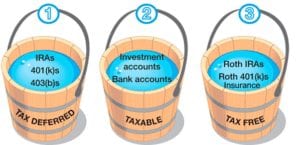Annual Financial To-Do List
Things you can do for your future as the year unfolds.
What financial, business, or life priorities do you need to address for the coming year? Now is an excellent time to think about the investing, saving, or budgeting methods you could employ toward specific objectives, from building your retirement fund to managing your taxes. You have plenty of choices. Here are a few ideas to consider:
Can you contribute more to your retirement plans this year? In 2021, the contribution limit for a Roth or traditional individual retirement account (IRA) is expected to remain at $6,000 ($7,000 for those making “catch-up” contributions). Your modified adjusted gross income (MAGI) may affect how much you can put into a Roth IRA. With a traditional IRA, you can contribute if you (or your spouse if filing jointly) have taxable compensation, but income limits are one factor in determining whether the contribution is tax-deductible.1
Remember, withdrawals from traditional IRAs are taxed as ordinary income, and if taken before age 59½, may be subject to a 10% federal income tax penalty starting again in 2021. Roth IRA distributions must meet a five-year holding requirement and occur after age 59½ to qualify for tax-exempt and penalty-free withdrawal. Tax-free and penalty-free withdrawals from Roth IRAs can also be taken under certain other circumstances, such as a result of the owner’s death.2
Keep in mind, this article is for informational purposes only, and not a replacement for real-life advice. Also, tax rules are constantly changing, and there is no guarantee that the tax landscape will remain the same in years ahead.
Make a charitable gift. You can claim the deduction on your tax return, provided you follow the Internal Review Service (I.R.S.) guidelines and itemize your deductions with Schedule A. The paper trail is important here. If you give cash, you should consider documenting it. Some contributions can be demonstrated by a bank record, payroll deduction record, credit card statement, or written communication from the charity with the date and amount. Incidentally, the I.R.S. does not equate a pledge with a donation. If you pledge $2,000 to a charity this year but only end up gifting $500, you can only deduct $500.3
These are hypothetical examples and are not a replacement for real-life advice. Make certain to consult your tax, legal, or accounting professional before modifying your record-keeping approach or your strategy for making charitable gifts.
See if you can take a home office deduction for your small business. If you are a small-business owner, you may want to investigate this. You may be able to write off expenses linked to the portion of your home used to conduct your business. Using your home office as a business expense involves a complex set of tax rules and regulations. Before moving forward, consider working with a professional who is familiar with home-based businesses.4
Open an HSA. A Health Savings Account (HSA) works a bit like your workplace retirement account. There are also some HSA rules and limitations to consider. You are limited to a $3,600 contribution for 2021 if you are single; $7,200 if you have a spouse or family. Those limits jump by a $1,000 “catch-up” limit for each person in the household over age 55.5
If you spend your HSA funds for non-medical expenses before age 65, you may be required to pay ordinary income tax as well as a 20% penalty. After age 65, you may be required to pay ordinary income taxes on HSA funds used for nonmedical expenses. HSA contributions are exempt from federal income tax; however, they are not exempt from state taxes in certain states.
Pay attention to asset location. Tax-efficient asset location is one factor that can be considered when creating an investment strategy.
Review your withholding status. Should it be adjusted due to any of the following factors?
* You tend to pay the federal or state government at the end of each year.
* You tend to get a federal tax refund each year.
* You recently married or divorced.
* You have a new job, and your earnings have been adjusted.
These are general guidelines and are not a replacement for real-life advice. Make certain to consult your tax, human resources, or accounting professional before modifying your withholding status.
Did you get married in 2020? If so, it may be an excellent time to consider reviewing the beneficiaries of your retirement accounts and other assets. The same goes for your insurance coverage. If you are preparing to have a new last name in 2021, you may want to get a new Social Security card. Additionally, retirement accounts may need to be revised or adjusted?
Are you coming home from active duty? If so, go ahead and check on the status of your credit and any tax and legal proceedings that might have been preempted by your orders.
Consider the tax impact of any upcoming transactions. Are you planning to sell any real estate this year? Are you starting a business? Might any commissions or bonuses come your way in 2021? Do you anticipate selling an investment that is held outside of a tax-deferred account?
If you are retired and in your seventies, remember your RMDs. In other words, Required Minimum Distributions (RMDs) from retirement accounts. Under the SECURE ACT, in most circumstances, once you reach age 72, you must begin taking RMDs from most types of these accounts.6
Vow to focus on your overall health and practice sound financial habits in 2021. And don’t be afraid to ask for help from professionals who understand your individual situation.
This material was prepared by MarketingPro, Inc., and does not necessarily represent the views of the presenting party, nor their affiliates. This information has been derived from sources believed to be accurate. Please note – investing involves risk, and past performance is no guarantee of future results. The publisher is not engaged in rendering legal, accounting or other professional services. If assistance is needed, the reader is advised to engage the services of a competent professional. This information should not be construed as investment, tax or legal advice and may not be relied on for the purpose of avoiding any Federal tax penalty. This is neither a solicitation nor recommendation to purchase or sell any investment or insurance product or service, and should not be relied upon as such. All indices are unmanaged and are not illustrative of any particular investment.
Riverfront Financial and The O.N. Equity Sales Company are unaffiliated companies
Citations
-
thefinancebuff.com, August 12, 2020
-
usnews.com, February 12, 2020
-
irs.gov, April 3, 2020
-
nerdwallet.com, July 31, 2020
-
msn.com, August 19, 2020








